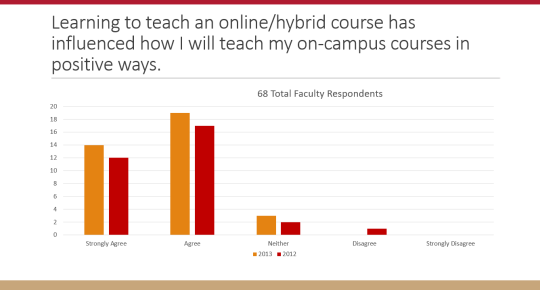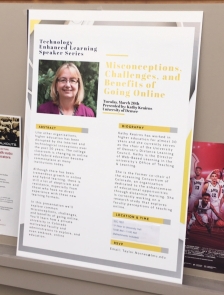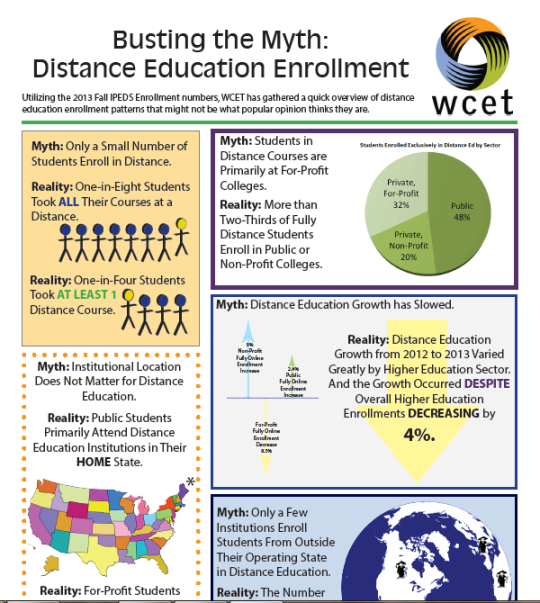Babson recently released their 12th annual survey that tracks online education in the United States based on responses from over 2,800 CAO’s and data from IPEDS. As always, the release of this important online tracking survey has generated a lot of buzz and back-channel conversations. The Online Learning Consortium shared the survey with their members and invited us to share how our university is making online learning a success. I apologize in advance for the longer than usual post.
This blog post will highlight the University of Denver’s successful model for implementing online courses within our traditional undergraduate programs. Note that our definition of online/distance courses is a course in which “all or nearly all of the organized instruction is conducted online or by distance learning methodologies.”
How the University of Denver (DU) is Making Online Learning a Success

The University of Denver, a private, residential university embraced online education a bit later than some of our competitors. Like many other colleges and universities, distance and online education at DU was primarily housed in our professional and continuing education studies division, University College. Very few online courses were offered within our traditional academic degree programs until 2009 when we started an online learning initiative.
Fourteen full-time faculty members participated in a pilot project to explore the value of providing traditional undergraduate students the opportunity to take online courses. From the very beginning, we built a comprehensive faculty development component into the program. As a private, residential university, we knew we had to provide our online students with the same type of personalized learning experience that they were accustomed to in their on-campus classrooms.
The faculty members in the pilot participated in an intensive faculty development program called the Teaching Online Workshop (TOW). The workshop allows faculty members to experience online learning first-hand from the student perspective. They learn best practices for designing and facilitating online courses, all while developing their online course as part of the required workshop activities.
The vast majority of faculty members who participated in the pilot indicated that they felt that the faculty development activities were necessary for them to learn how to teach online, that the initial creation of an online course was time-consuming but that they would teach an online course again because of the generally positive outcomes they observed. The program has now expanded to include graduate level and hybrid courses.
Over 165 faculty members in disciplines from all areas of the university have completed the Teaching Online Workshop. Here’s what some of them said about their experience in the Teaching Online Workshop:
“Participating in the TOW helped me recognize what quality online learning looks like and changed my perception of online courses for the better. As a student in this online workshop, I was able to experience firsthand how thoughtful course design and judicious use of multimedia tools can come together to create a rich learning environment. Practically speaking, the TOW also provided a fantastic opportunity to develop a course with thoughtful feedback and ongoing support from the instructors and my colleagues. The TOW is a wonderful resource for any instructor who is new to online teaching.”
– Assistant Professor, Department of Psychology
“While demanding, the Teaching Online Workshop is well worth the effort it takes. Beyond learning how to negotiate Canvas and being introduced to the Quality Matters Program for online course design, you receive astonishingly detailed feedback as you build your course from instructors who have terrific pedagogical instincts, who review your materials with tremendous care, and who offer invaluable suggestions and strategies for improvement.”
– Professor, Department of Religious Studies
Even some tenure-track faculty members with years of teaching experience who completed TOW reported that teaching online changed the way they teach their classroom-based courses. I’m sure this is not a surprise to many people still reading this post, and not unique to the University of Denver. Online learning and digital technologies are fueling pedagogical innovations which is also impacting student success in all college classrooms (online, hybrid, blended, flipped, face-to-face). As John Sener wrote in The Seven Futures of American Education, “online education has driven pedagogical innovation.” And I’ve heard this over and over again, from multiple articles and research studies, but more importantly, from professors at DU and my colleagues in the eLearning Consortium of Colorado. I’m happy to report that DU’s Teaching Online Workshop is now required of faculty members who teach online courses within our traditional academic programs.
I appreciate all of the wonderful research and professional development efforts by organizations such as BSRG, WCET, OLC, IHE, QM and other leaders in the online and distance education world. In the future, I hope more questions about faculty development will be included in research, surveys and discussions about online education.

 face-to-face (FTF) teaching by:
face-to-face (FTF) teaching by:

 Workshop is an online course for faculty new to teaching online. Participants experience online education first-hand as students in this intensive four- week course.
Workshop is an online course for faculty new to teaching online. Participants experience online education first-hand as students in this intensive four- week course. the
the 
 online education and I was thrilled to receive an autographed hard copy of Teaching in the Digital Age at the conference. I use this as the textbook for my Teaching, Learning & Technology online course. Although the book was written 2015, it is still very relevant and worth checking out.
online education and I was thrilled to receive an autographed hard copy of Teaching in the Digital Age at the conference. I use this as the textbook for my Teaching, Learning & Technology online course. Although the book was written 2015, it is still very relevant and worth checking out.



Written
on November 11, 2018